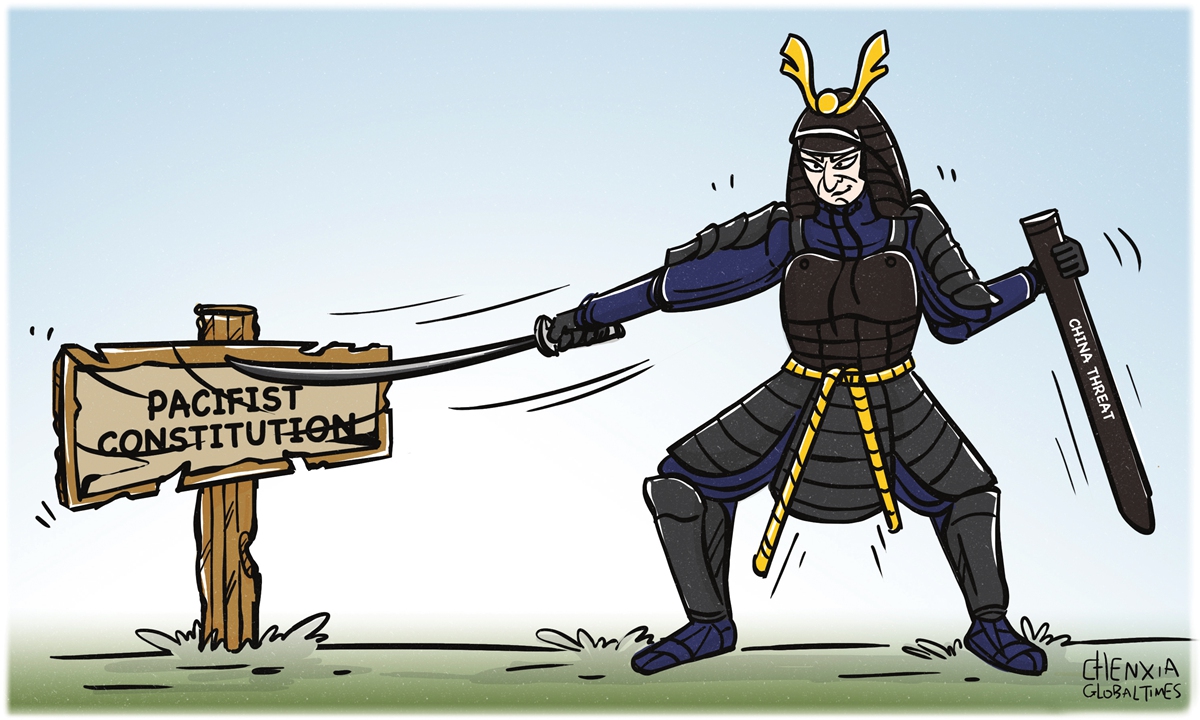
Illustration: Chen Xia/GT
Japan is considering deploying 1,000 long-range cruise missiles to boost its counterattack capability against China. The missiles would be able to reach coastal areas of North Korea and China, Japanese newspaper Yomiuri Shimbun reported Sunday.
Japan has constantly shown its hostility and aggression toward China, which runs counter to the country's pacifist constitution and casts a long-term shadow over China-Japan relations.
The Chinese government has never demonstrated strategic hostility toward Japan and has consistently advocated managing frictions over the Diaoyu Islands. China's resolution of the Taiwan question aims to achieve complete national reunification, which does not include a strategic calculation of how to deal with Japan.
But the Japanese government has spared no effort in hyping up the controversy on Diaoyu Islands. Meanwhile, Japan's attempt to intervene in the Taiwan question has become increasingly blatant. The extreme threat that "a Taiwan emergency is a Japanese emergency" has become Tokyo's semi-official attitude, and it has included a "strategic ambiguity" - the possibility of Japan's participation in the possible war if the Chinese mainland reunifies the island of Taiwan by force. And now, it is ever more provocative for Tokyo to float a trial balloon regarding the plan of deploying 1,000 missiles that can strike China's coastal areas.
China has never indicated that its missiles would aim at the targets in Japan, nor has it ever made any plan to attack Japan. Yet, Tokyo is going to "counterattack" China. China has never promised to give up the use of force regarding the Taiwan question as a measure to counter "Taiwan independence" forces and promote its national reunification. This means that a war in the Taiwan Straits could break out if Taiwan secessionists cross the Chinese mainland's redline or if possibilities for a peaceful reunification are completely exhausted.
If US troops use its bases in Japan to attack the Chinese People's Liberation Army (PLA), then Tokyo should ask itself - shouldn't the PLA destroy those US bases in Japan? And if Japan's Self-Defense Forces engage in this war, shouldn't the PLA destroy those forces?
But such possibilities don't mean that China is plotting a war against Japan - there is a difference between striking US bases that support war and attacking Japan. If Tokyo wants to secure its territory from any attack, it should restrict US troops from using their bases in Japan and keep those bases away from a future war in the Taiwan Straits should it break out.
It is important to note that Japan needs to be highly clear-headed. If China doesn't take the initiative to mess with it, Japan should not make the mistake of trying to mess with China to display its sham courage and voluntarily become a pawn for the US to contain China. As Japan suffered significant losses in World War II for having attacked the US, it shouldn't make this fundamental strategic mistake of suffering more by evoking China's counterattack.
Deploying 1,000 missiles won't be able to intimidate China, and it will not be difficult for China to work a bit harder to build 5,000 more missiles to "serve" Japan when it attacks China with its missiles. China has never taken the initiative to lead the two sides' disputes and conflicts toward a war, so Japan should also be more restrained instead of stirring bilateral relations up and forcing it toward "a future war bound to occur."
The Chinese people are well aware that cooperation benefits both China and Japan, while confrontation serves neither. Once a major conflict breaks out between China and Japan, the only one that will benefit from it will be the US.
China has no intention of being hostile toward Japan. Maintaining friendly ties with Japan is China's long-term will and basic policy. It is hoped that the Japanese side will restrain its extreme fantasies about deteriorating ties between China and Japan, so as to prevent doing stupid things and turning what was make-believe to become true. Japan is advised not to push itself into a gamble it is unable to bear.
The author is a commentator with the Global Times. opinion@globaltimes.com.cn




